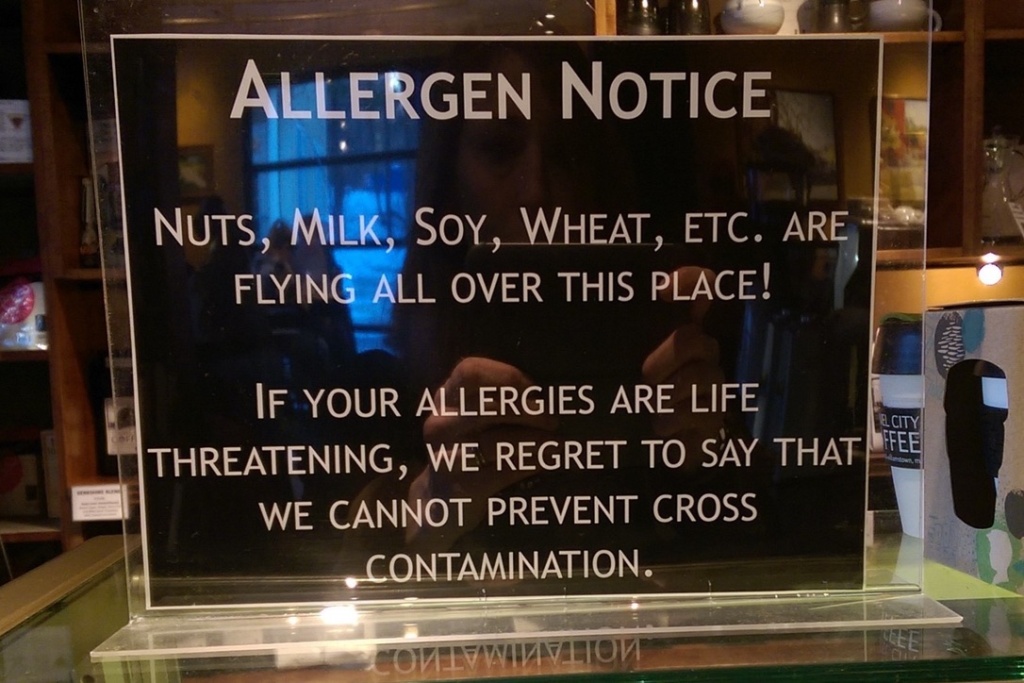Allergen Disclaimers | Food for Thought | Allergy Companions

By Liljia Polo-Richards
“Why do I regularly discuss allergen disclaimers?”
It’s a question that I frequently get asked, particularly by people who work in hospitality.
For me, the answer extends beyond mere food safety compliance; it revolves around building trust, ensuring safety, and communicating effectively with consumers.
Unfortunately, in many instances, businesses fall short or overlook this crucial aspect of customer service.
My Position
Let me be unequivocal about my standpoint:
- I don’t think that restaurants, cafes or hotels need to be able to cater for everyone,
- For some cuisines, certain allergens are too prevalent in dishes, and the safest thing to do is to not serve customers with a specific allergy (think peanuts in Thai food),
- I have a lot of sympathy for hospitality, as allergies and allergens are a massive challenge for them, and allergies are sadly on the rise.
Crafting Effective Allergen Messages
However, conveying the above information to customers requires businesses to go through an effective risk assessment in order to provide clarity and a commitment to transparency.
It also requires businesses to take a step back, to understand what message they want to convey, their standpoint on allergens and catering for people with allergies, and why their current allergen message is written in a certain way.

Key considerations when crafting allergen messages
Information on what customers can expect when visiting a venue needs to be made clear in the allergen disclaimer, but appropriate language needs to be used to convey the message.
Here are some of the things businesses need to consider when crafting an allergen message:
1. Are all top 14 allergens used in the kitchen or are there any that are not used? If so, could this be articulated so that customers understand what to expect? For example, if nuts are not used in the kitchen, could this be articulated?
2. Is the kitchen too small? If so, could this be made clear to advise why cross-contamination is very likely to occur? In this way, customers will understand why the venue cannot cater for them and will not assume that the business is simply trying to cover themselves;
3. Are vegan dishes safe for people with allergies, and if not, could this be made clear in the allergen statement?
4. Are “may contains” listed on the allergen menus? Has any PAL information from any pre-packed ingredients and products been taken into account when writing the allergen menu?
5. Are customers encouraged to have a discussion about their allergies? Is the allergen message making them feel welcome by the venue?
The importance of positive language
It is important to note that allergen disclaimers should always employ respectful and positive language, and there is no need to use derogatory, inflammatory or discriminatory language in these messages.
These disclaimers exist not only to inform consumers, but also to ensure their safety and wellbeing.
If the safest option for an individual is to avoid an establishment, that decision should be communicated with empathy and following a thorough risk assessment.
Concluding thoughts
In conclusion, allergen disclaimers represent far more than a legal requirement. They are a way for hospitality to communicate with their customers in a responsible and ethical way.
By prioritising thoughtful communication, transparency, and empathy, businesses can foster trust and ensure the safety of all customers.
As we navigate this complex topic, let’s continue the dialogue and strive for continuous improvement in how we communicate and accommodate dietary needs.
For more information on how we can help your business write the perfect allergen message, please visit our Consulting Services page and get in touch.

